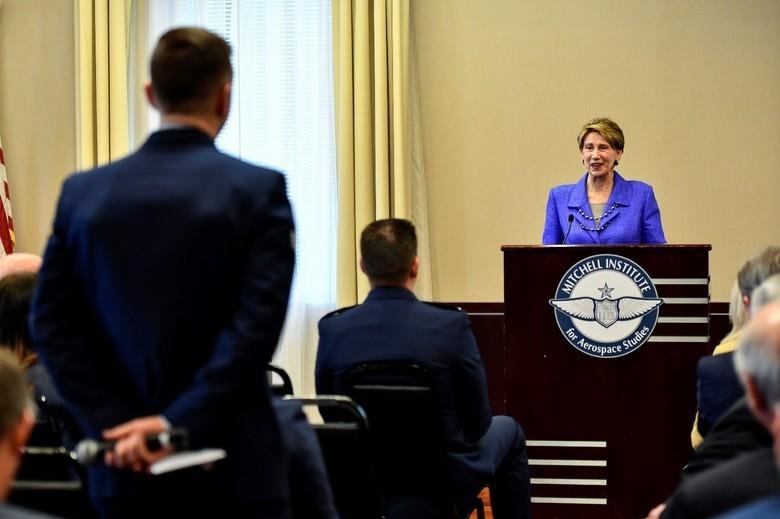Air Force Secretary Barbara Barrett answers an Airman's question about joining U.S. Space Force during a forum Tuesday in Washington, D.C. Photo by Eric Dietrich/U.S. Air Force
March 11 (UPI) -- Secretary of the Air Force Barbara Barrett said this week that better transparency may be the key to overcoming skepticism about the newly created Space Force.
Much of what the Space Force -- previously known as Air Force Space Command -- has done is shrouded by "overclassification," Barrett said in remarks delivered to the Mitchell Institute for Aerospace Studies on Capitol Hill, meaning the military's emphasis on secrecy has probably hindered support for the new branch.
"Some classified capabilities designed to be a deterrent may be over-classified," Barrett said. "We will work with Congress to balance protection of national secrets with the need to share information and build support for our space forces, striking the right balance of what we reveal versus conceal."
One example, Barrett said, was the X-37B program.
The Air Force's X-37B Orbital Test Vehicle Mission 5 space plane spent more than two years in orbit, completing its mission in October.
But the Air Force said little about what the aircraft was for, leading to years of public speculation about the actual purpose of the program.
"We have openly acknowledged the existence of, and missions flown by, this reusable space vehicle," Barrett said. "But beyond a hand-wave explanation of 'testing and developing technologies for future missions,' ... we are asking the American people to spend an enormous amount of money on capabilities about which they know nothing."
"While this is often appropriate for security reasons, we are carefully looking at where -- and how much -- classification is truly needed," she added.
Barrett also said the recent discovery of a Russian satellite maneuvering "suspiciously near" a U.S. satellite is a clear sign of space's changing nature and the necessity of Space Force.
During the Cold War, space was primarily the sole province of the United States and the Soviet Union, but since its end more than 40 countries -- including Japan, China, India and much of Europe -- have begun using space-based satellites, probes and sometimes manned spacecraft.
"This new space environment, complex and contested, calls for a new approach from the United States," Barrett said, noting that the first step was designating in 2019 the U.S. Space Command as a stand-alone combatant command.















